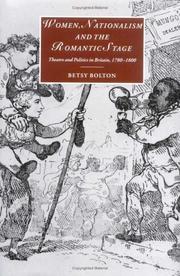| Listing 1 - 1 of 1 |
Sort by
|

ISBN: 0521771161 9780521771160 9780521023030 0521023033 Year: 2001 Volume: 46 Publisher: Cambridge New York Oakleigh Cambridge University Press
Abstract | Keywords | Export | Availability | Bookmark
 Loading...
Loading...Choose an application
- Reference Manager
- EndNote
- RefWorks (Direct export to RefWorks)
"In the 1780s and 1790s, theatre critics described the stage as a state in political tumult, while politicians invoked theatre as a model for politics both good and bad. In this study, Betsy Bolton examines the ways Romantic women performers and playwrights used theatrical conventions to intervene in politics. Reading the public performances of Emma Hamilton and Mary Robinson through the conventions of dramatic romance, Bolton suggests that the romance of national identity developed by writers such as Souther and Wordsworth took shape in complex opposition to these unruly women. Setting the conventions of farce against those of sentiment, playwrights such as Hannah Cowley and Elizabeth Inchbald questioned imperial relations while criticizing contemporary gender relations. This well-illustrated study draws on canonical poetry and personal memoirs, popular drama and parliamentary debates, political caricatures and theatrical reviews to extend current understandings of Romantic theatre, the public sphere, and Romantic gender relations."--Jacket.
Nationalism in literature --- Nationalisme dans la littérature --- Nationalisme in de literatuur --- Drama. --- Englisch. --- English drama --- English drama. --- Frau. --- Nationalism in literature. --- Nationalism --- Nationalism. --- Nationalismus. --- Political plays, English --- Political plays, English. --- Politics and government. --- Politics and literature --- Politics and literature. --- Politik. --- Romanticism --- Romanticism. --- Theater --- Women and literature --- Women and literature. --- History and criticism --- Women authors --- History and criticism. --- Women authors. --- History --- Political aspects --- Political aspects. --- 1700-1799. --- Geschichte 1780-1800. --- Great Britain --- Great Britain. --- Politics and government --- 18th century --- Political plays [English ] --- Theater - Political aspects - Great Britain - History - 18th century.
| Listing 1 - 1 of 1 |
Sort by
|

 Search
Search Feedback
Feedback About UniCat
About UniCat  Help
Help News
News